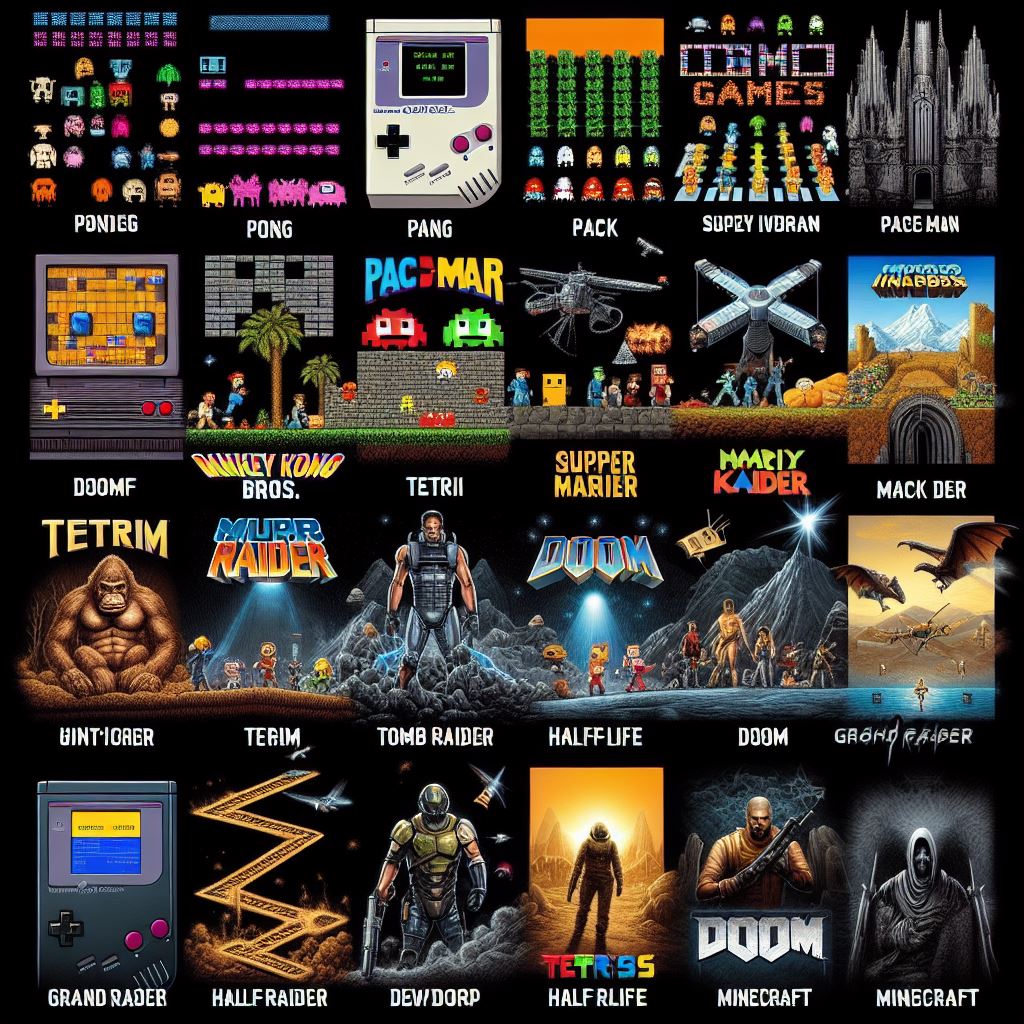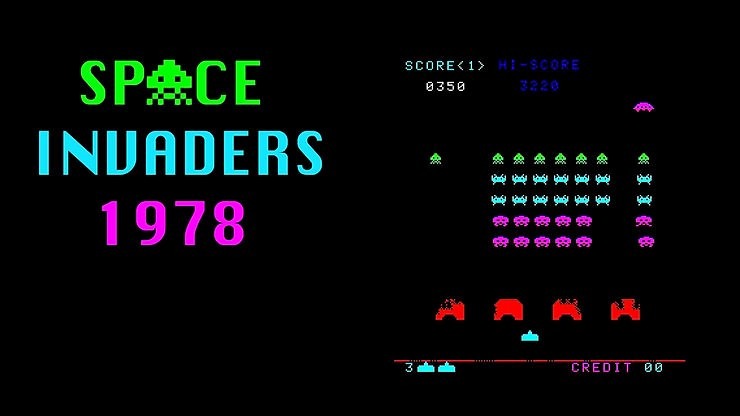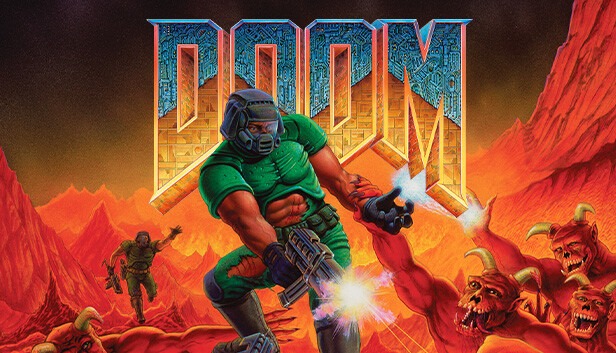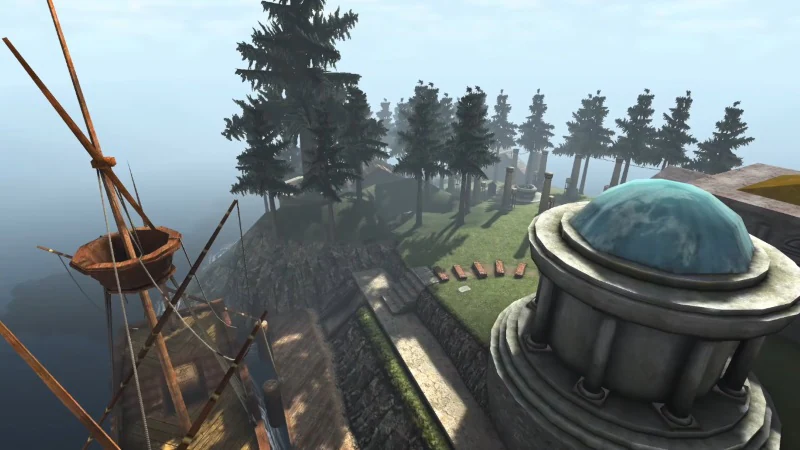Video games have come a long way since the early days of Pong and Space Invaders. Today’s games are more immersive, more complex, and more innovative than ever before, and they owe much of their success to the pioneers who paved the way. In this article, we take a look at the 10 video games that changed the industry forever.
1. Space Invaders (1978)
Space Invaders, a groundbreaking shoot ’em up arcade game, emerged onto the scene in 1978, crafted and unleashed by Taito in Japan, and later licensed to Midway Manufacturing for global distribution. Regarded as a cornerstone of gaming history, Space Invaders pioneered the fixed shooter genre, laying down the blueprint for countless titles to follow. Its impact reverberates through the annals of gaming, earning it a well-deserved spot among the most influential video games of all time.
2. Battlezone (1980)
Battlezone stands as a pivotal milestone in gaming history, often hailed as the pioneer of 3D arcade gaming. However, it carries with it a nuanced distinction. While Battlezone may not fit the strict definition of a “true” 3D game, its utilization of vector graphics and a first-person perspective masterfully simulated a 3D experience, earning it recognition as a trailblazer in the realm of three-dimensional gameplay.
Far from diminishing its significance, this distinction only serves to underscore Battlezone’s innovations. Its impact reverberates throughout the gaming landscape, as subsequent titles drew inspiration from its groundbreaking technology to craft immersive gaming experiences. Remarkably, even years later, many games continued to rely on similar techniques to emulate genuine 3D environments.
Battlezone’s legacy extends beyond its technical achievements. It demonstrated the allure and commercial viability of pushing the boundaries of graphical capabilities, laying the groundwork for the ongoing evolution of 3D visuals in gaming. In the annals of gaming history, Battlezone remains a towering testament to innovation and foresight, forever etched as a cornerstone of the medium’s advancement.
3. Mystery House (1980)
Mystery House stands as a seminal achievement in gaming history, marking a significant leap forward in the evolution of computer adventure games. While text-based adventures had long captivated players with their intricate narratives, Mystery House shattered barriers by introducing proper graphics to the genre, revolutionizing the way stories were told and experiences were crafted.
What sets Mystery House apart is its pioneering emphasis on artistry within gaming. The visionary work of artist Roberta Williams heralded a paradigm shift in the industry, highlighting the symbiotic relationship between artistry and programming. Williams’s distinct style not only breathed life into Mystery House but also paved the way for a new era where video game artists would be recognized for their unique contributions in shaping the gaming landscape.
Williams’s groundbreaking efforts extended beyond Mystery House, as she went on to create the iconic King’s Quest series, further cementing the connection between artistry and gaming. Through her visionary storytelling and visually stunning creations, Williams helped bridge the gap between eras, from Mystery House to the LucasArts era, and beyond, shaping our modern understanding of artist-driven visuals in gaming.
Mystery House’s legacy endures as a testament to the transformative power of artistry in gaming, forever etching its place in the annals of gaming history as a pioneer of interactive storytelling and graphical innovation.
4. Dragon’s Lair (1983)
Indeed, Dragon’s Lair emerges as a towering figure in the realm of gaming history, deserving of a top-ranking position in any retrospective discussion. Its utilization of the cutting-edge LaserDisc format, coupled with a myriad of technical innovations, catapulted it to the forefront of gaming consciousness.
What sets Dragon’s Lair apart is its revolutionary approach to captivating players primarily through its stunning visuals. In an era where gameplay reigned supreme, Dragon’s Lair defied convention by entrancing gamers with its cinematic allure. Its unprecedented visual fidelity and immersive animation captivated audiences, drawing them into a gaming experience that resembled the most awe-inspiring animated films of its time.
Dragon’s Lair’s impact transcended the confines of the arcade, playing a pivotal role in revitalizing the struggling gaming industry in the aftermath of the console crash. Its popularity soared to unprecedented heights, breathing new life into arcades and igniting a renewed passion for gaming among enthusiasts.
While Dragon’s Lair may have offered minimal gameplay mechanics, its sheer visual spectacle was enough to captivate audiences worldwide. Its influence reverberates through the annals of gaming history, forever etching its place as a savior of the arcade industry and a beacon of innovation in the gaming landscape.
5. Super Mario Bros. (1985)
Super Mario Bros. revolutionized the gaming landscape in countless ways, leaving an indelible mark on the industry that resonates to this day. Introducing the side-scrolling platformer genre to the masses, it propelled Nintendo into the spotlight as a powerhouse in gaming.
What sets Super Mario Bros. apart is its unparalleled impact on game design, setting a gold standard against which all future titles would be measured. From its meticulously crafted levels to its iconic characters and fluid gameplay mechanics, Super Mario Bros. captivated players with its unparalleled sense of adventure and exploration.
Beyond its immediate success, Super Mario Bros. laid the foundation for Nintendo’s enduring legacy, shaping the company’s identity as a titan of innovation and creativity in gaming. Its influence extended far beyond its release, inspiring generations of developers to push the boundaries of what was possible in game design.
In essence, Super Mario Bros. wasn’t just a game—it was a cultural phenomenon that reshaped the gaming landscape and left an indelible imprint on the hearts and minds of players worldwide.
5. Doom (1993)
Doom stands as an iconic milestone in gaming history, credited with catapulting the first-person shooter genre into the mainstream. Its adrenaline-fueled gameplay, blistering pace, and cutting-edge graphics shattered the boundaries of gaming, pushing the medium to new heights of excitement and immersion.
What sets Doom apart is its relentless commitment to delivering an unparalleled gaming experience. From its heart-pounding action to its immersive atmosphere, Doom captivated players with its visceral thrills and groundbreaking mechanics.
Doom’s impact reverberated far beyond its initial release, shaping the trajectory of the gaming industry for decades to come. Its influence can be seen in countless titles that followed, as developers sought to capture the same magic that made Doom a cultural phenomenon.
In essence, Doom wasn’t just a game—it was a revolution that forever changed the landscape of gaming, inspiring generations of players and developers alike with its relentless innovation and unparalleled excitement.
6. Myst (1993)
Myst stands as a seminal masterpiece in the realm of gaming, heralding a new era of storytelling and immersion. Its groundbreaking approach to exploration and puzzle-solving within a fully realized 3D world captivated players worldwide, setting a precedent for narrative-driven gameplay experiences.
What sets Myst apart is its unparalleled ability to transport players to a meticulously crafted universe brimming with mystery and intrigue. From its hauntingly beautiful landscapes to its enigmatic puzzles, Myst captivated audiences with its immersive atmosphere and rich narrative tapestry.
Myst’s success not only reshaped the gaming landscape but also paved the way for a new generation of narrative-driven titles. Games like The Witness and Firewatch owe a debt of gratitude to Myst for pioneering the concept of immersive storytelling and pushing the boundaries of what was possible in gaming.
In essence, Myst wasn’t just a game—it was a transformative experience that forever changed the way we think about storytelling and exploration in video games. Its legacy endures as a testament to the power of imagination and innovation in shaping the future of gaming.
7. Grand Theft Auto III (2001)
Grand Theft Auto III stands as a watershed moment in gaming history, single-handedly revolutionizing the open-world genre and leaving an indelible mark on the industry. Its immersive sandbox-style gameplay and daring subject matter shattered conventions, setting a new gold standard for interactive experiences.
What sets Grand Theft Auto III apart is its audacious embrace of freedom and exploration within a sprawling urban landscape. Players were thrust into a vibrant, living world teeming with possibilities, where every street corner held the promise of adventure and danger.
Grand Theft Auto III’s impact extended far beyond its release, shaping the trajectory of the gaming industry for years to come. Its influence can be felt in countless titles that followed, as developers sought to capture the same sense of freedom and immersion that made Grand Theft Auto III a cultural phenomenon.
In essence, Grand Theft Auto III wasn’t just a game—it was a revolution that forever changed the way we think about open-world gameplay and storytelling in video games. Its legacy endures as a testament to the power of innovation and creativity in pushing the boundaries of what is possible in gaming.
8. World of Warcraft (2004)
World of Warcraft stands as an unparalleled titan in the realm of MMORPGs, reshaping the genre and leaving an indelible mark on the gaming landscape. Its vast, persistent world, immersive storytelling, and addictive gameplay forged a new standard of excellence that reverberates throughout the industry.
What sets World of Warcraft apart is its unmatched ability to transport players into a sprawling, living universe teeming with adventure and camaraderie. From its meticulously crafted lore to its dynamic gameplay systems, World of Warcraft captivated millions with its immersive world-building and endless possibilities for exploration and discovery.
The impact of World of Warcraft extends far beyond its own player base, influencing a generation of game developers and shaping the evolution of the MMORPG genre. Countless games have drawn inspiration from its groundbreaking design principles, seeking to capture the same sense of community, immersion, and epic scale that made World of Warcraft a cultural phenomenon.
In essence, World of Warcraft wasn’t just a game—it was a revolution that forever changed the way we think about online gaming and virtual worlds. Its legacy endures as a testament to the power of innovation and creativity in shaping the future of interactive entertainment.
9. Portal (2007)
Portal revolutionized the gaming industry by introducing groundbreaking gameplay mechanics and a compelling narrative that captivated players worldwide. At its core, Portal challenged conventional gaming norms with its utilization of physics-based puzzles, requiring players to think critically and creatively to navigate through each level.
What truly set Portal apart, however, was its masterful storytelling. Set within the mysterious Aperture Science Enrichment Center, players were immersed in a world filled with dark humor and intrigue. The enigmatic AI antagonist, GLaDOS, provided both guidance and menace, creating a dynamic and unforgettable character that elevated the game’s narrative to new heights.
As players delved deeper into the game, they uncovered the dark secrets of Aperture Science and unraveled the true nature of their existence. The juxtaposition of the game’s seemingly lighthearted aesthetic with its underlying themes of isolation and control added layers of depth to the experience, leaving a lasting impact on those who played it.
Portal’s influence extended far beyond its initial release, inspiring countless games to adopt its innovative gameplay mechanics and narrative approach. Its status as a classic remains undisputed, with its legacy continuing to resonate with gamers and developers alike, proving that innovation and storytelling can converge to create truly unforgettable gaming experiences.
10. Minecraft (2011)
Minecraft redifened the gaming industry with its unparalleled emphasis on creativity and community engagement. Through its open-ended gameplay and robust user-generated content tools, Minecraft empowered players to unleash their imagination and craft their own virtual worlds, limited only by their creativity.
What sets Minecraft apart is its ability to foster a vibrant and inclusive community of players who share their creations, collaborate on projects, and collectively push the boundaries of what is possible within the game. From sprawling cities and intricate redstone contraptions to whimsical fantasy realms and faithful recreations of real-world landmarks, the Minecraft community has produced an astonishing array of content that continues to inspire and amaze.
The success of Minecraft not only solidified its status as a cultural phenomenon but also paved the way for the rise of similar sandbox-style games like Roblox and Fortnite. These games, while distinct in their own right, owe a debt of gratitude to Minecraft for demonstrating the immense potential of user-generated content and community-driven gameplay.
In essence, Minecraft wasn’t just a game—it was a platform for boundless creativity and collaboration, fostering a global community of players united by their shared love of exploration, creation, and discovery. Its impact on the gaming industry and popular culture at large is undeniable, leaving an enduring legacy that continues to shape the way we play and interact in virtual worlds.
11. The Last of Us (2013)
The Last of Us redefined storytelling in video games, setting a new standard for emotional depth and immersive gameplay. Through its cinematic presentation and character-driven narrative, The Last of Us elevated the medium, demonstrating the power of interactive storytelling to evoke genuine emotional responses from players.
What sets The Last of Us apart is its masterful blending of gameplay and narrative, seamlessly weaving together moments of intense action with poignant character development and thematic exploration. From the hauntingly beautiful post-apocalyptic world to the complex relationships between its characters, The Last of Us invites players to not only experience the story but to become active participants in its unfolding.
The game’s emotional impact is palpable, drawing players into its world and immersing them in the struggles and triumphs of its protagonists. Through its nuanced storytelling and richly developed characters, The Last of Us challenges players to confront difficult questions about morality, survival, and the human condition.
The success of The Last of Us has reverberated throughout the gaming industry, inspiring a new wave of narrative-driven games that prioritize storytelling and character development. Its legacy as a game-changer in the realm of storytelling is undeniable, leaving an indelible mark on the medium and forever changing the way we think about narrative in video games.
12. Fortnite (2017)
Fortnite stands as a transformative force in the gaming world, reshaping the landscape of both the battle royale genre and online gaming culture at large. Its unprecedented popularity and innovative blend of gameplay mechanics and social features have propelled it to the forefront of the industry, solidifying its status as one of the most successful and influential games of all time.
What sets Fortnite apart is its ability to seamlessly blend fast-paced action with social interaction, creating a dynamic and engaging experience unlike anything seen before. From its vibrant, ever-evolving world to its intuitive building mechanics and addictive gameplay loop, Fortnite has captured the hearts and minds of millions of players worldwide.
The game’s impact extends far beyond its massive player base, influencing the way games are developed, marketed, and consumed. Fortnite has become a cultural phenomenon, permeating mainstream media and spawning a myriad of spin-offs, collaborations, and events that have captivated audiences of all ages.
In essence, Fortnite wasn’t just a game—it was a cultural phenomenon that reshaped the gaming landscape and redefined the possibilities of online gaming. Its legacy as a game-changer in the battle royale genre and beyond is undeniable, leaving an indelible mark on the industry that will be felt for years to come.
13. Verdict (2018)
“Verdict,” released in 2018, is a gripping interactive drama game that captivates players with its immersive storytelling and moral decision-making. Set in a courtroom setting, players take on the role of a defense attorney tasked with defending their client against a series of accusations.
What sets “Verdict” apart is its emphasis on player choice and consequence, as decisions made throughout the game directly impact the outcome of the trial. With branching narratives and multiple endings, each playthrough offers a unique experience, encouraging players to explore different paths to uncover the truth.
Additionally, “Verdict” showcases the potential of video games as a storytelling medium, blending elements of drama, suspense, and mystery to create a compelling and thought-provoking experience. Its innovative approach to narrative-driven gameplay sets a new standard for interactive storytelling in the gaming industry.
In Summary:
These 13 video games stand as monuments to innovation, each carving out its own unique legacy in the annals of gaming history. From groundbreaking gameplay mechanics to immersive storytelling and innovative online features, these games have reshaped the industry and continue to inspire game designers around the world.
Read Also:
- What Are The Applications Of Artificial Intelligence In Real Life?
- Human Inventions That Changed the World
📍 SEO & Content Strategist | Expert in Current Affairs, History, Geography & Education Blogs | Digital Marketing Specialist
Muhammad Talha Mehmood is a seasoned digital marketing specialist, SEO expert, and content strategist with over six years of experience in creating high-impact, research-driven content. As the driving force behind Globaleak.com, he delivers in-depth articles on current affairs, history, geography, and education, helping readers stay informed with accurate, well-researched insights.
🔹 Expertise & Achievements:
✔ SEO & Content Strategy: Specializes in creating authoritative, high-ranking content that aligns with Google’s EEAT guidelines.
✔ Research & Analysis: Covers historical events, geopolitical trends, and educational topics with in-depth research and expert insights.
✔ Proven Track Record: Has successfully worked with global clients, delivering content that enhances brand trust, audience engagement, and search rankings.
✔ Academic Excellence: Holds an MBA in Marketing from IBA, University of the Punjab, and a B.Com (Hons) from Hailey College of Commerce.
✔ Industry Experience: Started his career with Packages Limited, trained under PITB’s E-Rozgar Program, and later became a Team Leader & Trainer at Emenac Group of Companies.
🚀 Passionate about creating impactful content, Muhammad Talha ensures every article is insightful, engaging, and value-driven.
📧 Email: talhamehmood34@gmail.com
🔗 LinkedIn: linkedin.com/in/talhamehmood-34























